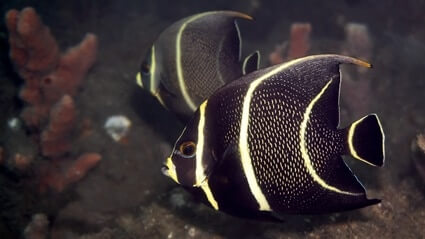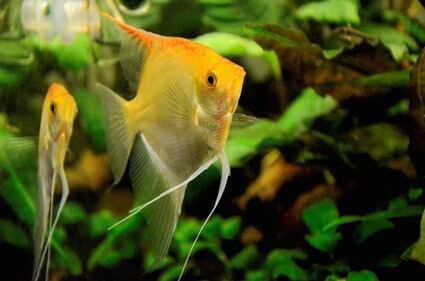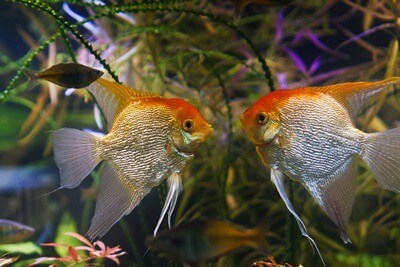Fighting, biting, and crashing into other fish are common among angelfish. However, the frequency of aggression might surprise some people.
Angelfish belong to the Cichlidae family, a very aggressive fish. Angelfish are the least hostile cichlids but fight more than the average aquarium fish.
Angelfish fight each other when mating, raising fry, and when stressed.
Male angelfish establish a hierarchy through fighting. They impress potential mates by driving out other fish from certain areas and claiming the territory.
Female angelfish become aggressive when trying to protect their eggs or their partner. Angelfish may also attack each other when their tank conditions are sub-optimal.
This could result in the angelfish killing each other. While that’s not always the case, you should check for aggression. It’ll become more prominent after eggs are laid or when paired up.
To calm down the fish, alter the tank’s conditions or separate the fish.
Why Is My Angelfish Being Aggressive?
It can seem nonsensical for angelfish to attack each other. However, it’s an expected behavior. This species has a reputation for being confrontational.
In part, this is because they belong to the Cichlidae family. Cichlids, like Oscar fish, are known for killing and eating most other tank mates they encounter.
While angelfish are less aggressive, they’ll still fight when provoked. Of course, some conditions can exacerbate their aggressive nature, including the following:
- Stress.
- Age.
- Breeding times.
- Mating times.
- Brood care.
Was the angelfish calm a few days ago but seems annoyed for no reason?
It may be a natural part of angelfish behavior. By evaluating the habits and environment of the angelfish, you can narrow down the cause. With this knowledge, you may be unable to calm the fish down.
Are My Angelfish Fighting or Mating?
It can be difficult for even seasoned angelfish keepers to know if their angelfish are mating or fighting.
You may try to separate a pair that’s done nothing wrong. That can delay breeding if you intend on raising fry. To determine the difference, start by identifying the signs of genuine fighting.

How Angelfish Fight
Angelfish in open conflict will engage in the following behavior:
- Rapid color change: When there’s a fight between two angelfish, the dominant angelfish will develop a more vibrant coloring. The weaker angelfish’s color will turn dull and pale.
- Chasing: Aggressive angelfish will drive out other fish to claim a part of the tank as their territory.
- Biting: When in a community tank, angelfish will bite the fins and tails of other fish. However, when two angelfish go up against each other, they will bite each other’s mouths.
- Lip-locking: When fighting, two angelfish will engage in “mouth fights.” This is a way to measure jaw size and determine who is more dominant.
- Parallel swimming: Angelfish have sense organs called lateral lines along their sides. They use these to determine their enemy’s swimming patterns and size them up.
How Angelfish Mate
Some of these behaviors, at a glance, will be shared in mating. The courting ritual for angelfish may also include actions that resemble:
- Parallel swimming.
- Color changing.
- Chasing.
- Biting.
The real deciding factor will be the abdomen. Take a look and see if their papilla is exposed:
- Female angelfish will have it sitting flatter on their stomachs
- Male papillae will protrude from their abdomen more
If neither of the angelfish have it exposed, it’s most likely 2 male angelfish fighting for dominance.
Why Are Angelfish Attacking Other Angelfish?
You can take action once you’ve determined that the angelfish are fighting. The first step will be narrowing down why they’re in conflict.
Some of these factors cannot be changed. Others will only last for a brief period. Others can be lessened with a few changes to the tank. Let’s explore all the causes for your angelfish’s sudden aggression.
Angelfish Fighting Due To Stress
While angelfish are hardy creatures, they get stressed relatively easily. If they don’t find a reprieve, the stress can become chronic. Long-term stress makes angelfish:
- Lethargic.
- Dull in color.
- Sickly.
Short-term stress activates their fight-or-flight mode and makes them violent. You’ll be able to tell when your fish is overwhelmed by stress if it’s:
- Swimming parallel.
- Displays rapid color changes.
- Swims erratically.
- Hides behind plants.
- Shows antisocial behavior.
Angelfish Get Angry From Water Changes
The most common reason angelfish experience short-term stress is due to water changes. The process can be very uncomfortable. That’s true even when taking all the necessary precautions.
In a study published in Applied Animal Behavior Science, it was shown that there’s a correlation between:
- The increased aggression levels in angelfish.
- The amount of water that was renewed with each water change.
In the study, they replaced 25, 50, and 0 (by removing the original water from the tank and immediately returning it). They observed the angelfish’s level of aggression 1, 2, and 24 hours after the renewal.
| Quantity of Water Renewed | Level of Immediate Aggression | Level of Aggression After 1 Hour | Level of Aggression After 24 Hours |
| 0% | Low | Low | Low |
| 25% | Medium | Low | Low |
| 50% | High | High | High |
Angelfish Get Angry From Light Changes
In nature, the sun traverses the sky gradually. Many plants cast a shadow over the rivers that wild angelfish call home. This is a stark difference from human homes.
Angelfish are sensitive to light. They become stressed when placed in a room where the illumination changes rapidly and frequently. Dim lights are best to keep angelfish happy.
Angelfish Get Angry From Quick Movements
Angelfish are slow swimmers, mainly because their waters have slow currents.
Predator fish tend to move quicker than angelfish do. The fish may perceive any quick movement as a source of danger.
The constant movement inside and outside the tank will distress angelfish to the point of aggression.
Energetic, fast-swimming fish all placed together will considerably increase angelfish aggression. This may cause your angelfish to attack other species or their own.
Angelfish Fighting Because Of Age
Angelfish are Cichlids and will grow into their more aggressive natures. When your angelfish appear to start fighting for no reason, look at where they are in their lifecycle.
Angelfish Dominance When Young
In males, aggression for this species of fish will start early. When the angelfish are juveniles, they may be eager to establish a territory. This leads to conflict. It will be especially prominent when there are a lot of male angelfish in the tank.
Even still, this fighting won’t be as bad or as frequent as when they are adults. If your angelfish are young, try to determine how old they are. This will let you know when to expect the fighting to start.
Fights Because Of Angelfish Mating Aggression
Angelfish become aggressive after reaching sexual maturity. That’s because there is an evolutionary pressure for them to reproduce. It has to do with the way they are socially set up to mate and breed.
Female angelfish choose partners but only select the most dominant ones. This means that male angelfish must compete for a chance to reproduce.
Even the smaller or weaker ones need to put up a fight. They all desire to be chosen, and that becomes the driving force of their aggression.
You can recognize this as the source of fighting when:
- Other fish avoid the area where the aggressive fish is.
- The fish is more vibrant in color, showing its dominance.
Angelfish Are Defensive Of Mates
Angelfish are monogamous, so they remain together once two angelfish become mates. If a pair is separated or one dies, the remaining angelfish will refuse to reproduce with another fish. That may seem adorable, but it can cause problems within the tank.
Paired angelfish are very protective of their mates, attacking others if they get too close.
A study in the Journal of Fish Biology showed that paired angelfish are likelier to attack other angelfish of the same gender. As such, the aggression maintains the bond between the two fish.
You can recognize this as the source of fighting when:
- The aggressive fish stays close to its mate.
- The female angelfish grows a bulging belly.
Fights Due To Angelfish Breeding Aggression
Just because angelfish are paired up and ready to breed doesn’t mean the aggression stops. These fish are jealous and willing to fight anyone who threatens what’s theirs. This includes their territory, food, mate, or brood.
Like most animals, angelfish are protective of their offspring. Aggression due to brood care starts when the female is pregnant with eggs.
The female will begin attacking any fish near her during this time. That’s true even when she’s inactive the rest of the time. She and her mate will spend 1 to 2 days cleaning the area where the eggs will be fertilized and hatched. Once the female releases the eggs, the male will fertilize them.
Why Are My Angelfish Fighting After Laying Eggs?
Your angelfish may grow aggressive once eggs are laid. The new brand of aggression will be very distinct.
- The fish will spend 1 to 2 days cleaning an area.
- The fish will be part of a mated pair.
- The stomach of the female angelfish will expand.
- Male angelfish will have its papilla protruding from its body.
- Female angelfish will swim slowly unless fighting with another fish.
The stress of parenthood will make your angelfish moody and antisocial. That stress will become intensified by several factors.
Disruptions
If a fish approaches the pair during their brood preparation, it may be perceived as a threat. The encroaching angelfish or other species will be:
- Chased off, in the best-case scenario.
- Attacked, in the worst-case scenario.
Lacking Decorations
Female angelfish like to release a line of eggs on broad leaves or flat surfaces. However, your aquarium may not have this. That will only stress the fish out more and increase the levels of aggression.
Overcrowding
An overcrowded tank will limit the space available to care for the eggs, increasing aggression levels.
Dirty Tank
A filthy tank will require more cleaning by the pair to prepare their territory. This causes them to:
- Expend more energy.
- Become tired.
- Become more stressed.
Tiredness
The pair’s combative nature continues once the eggs are laid. The parents will hover around the area. They’ll look out for their brood and protect them as much as possible.
They will also maintain a high rate of water circulation around the eggs. This is done by constantly swimming around them. They take turns doing this, but the process is tiring. It causes the angelfish parents to become high-strung and confrontational.
Are Male or Female Angelfish More Aggressive?
Male angelfish are much more aggressive than female angelfish. This begins early and will extend throughout their mating period.
Female angelfish don’t usually become confrontational until they pair up with a male. Once paired, they become hostile towards other female angelfish. However, this will not be as intense as paired males aggressive towards other males.
Will Angelfish Kill Each Other?
Sometimes, angelfish to fight to the death. They have been known to kill and eat smaller fish. It doesn’t matter if they’re tankmates or other angelfish.
These aggressive fish will not usually begin a fight with lethal intentions. However, there are cases where the disputes escalate. If one fish does not back down or the attacking fish is sufficiently threatened, it can result in death. This is most prominent when:
- A mated pair gangs up on one fish.
- A smaller fish challenges a larger fish and is unable to retreat.
- The fish is cornered and unable to disengage.
You should take fighting seriously. A few lunges or pecks can be marked up as dominance being established. However, if you find the angelfish:
- Has caused physical damage.
- Pursuing a fish.
- Has cornered one fish.
If this applies, it’s sensible to intervene.

Can You Stop Angelfish Fighting?
You cannot train the fighting instinct out of an angelfish. Likewise, there are no deterrents you can set in place. However, there are ways to stop the fights from continuing:
- Separate the fish into different tanks.
- Temporarily place a barrier between the fish, such as a netting.
As you can see, these methods won’t make your fish live in harmony. Instead, they remove the access that fish have to each other.
While changing tank conditions and lowering stress is helpful, it’s not always practical. Separation may be the only option if two or more angelfish are constantly starting fights.
How To Calm Down Angelfish?
With that said, if you catch the fighting early, you can apply less drastic measures. As long as the fish are not in immediate danger from one another, you have time to calm them down.
The main goal is to ensure the angelfish stop fighting. However, depending on what’s causing the aggression, you’ll need to do different things.
How to Stop Angelfish Bullying Because of Mating
Here are some of the solutions:
Give It Space
Angelfish need big tanks to thrive. That’s not only because of their size. It’s also because they need the space to pick out a territory.
If there isn’t enough, the other fish will have no choice but to invade the dominant angelfish’s territory. That can be detrimental to the health of everyone.
The other fish also need space to escape aggressive angelfish. If the smaller fish properly flees, the aggressive fish may calm itself down naturally.
If the close-quarters fight pings off all the walls, everyone’s stress levels will increase. This may result in the fight escalating to the point of death.
Give It Sufficient Food
Besides territory, male angelfish are very competitive when it comes to food. All the threatening, fighting, and sizing up will increase their appetite.
They become particularly ravenous and hostile at lunchtime.
If several aggressive males are in the tank, increase the amount of food. By doing so, they won’t have to fight each other for resources.
How to Stop Angelfish Bullying Because of Brood Care
Are your fish in the middle of laying eggs or protecting fry?
Separate The Pair
Pairs are confrontational. It’s wise to separate them from the other fish until they no longer have to care for their young.
Pairs do fine on their own. Isolation won’t stress them out if they have each other and the eggs they want to protect.
Give Them Sufficient Plants
Adding aquarium plants gives the angelfish pair more options when laying eggs. This reduces the stress of finding a good, protective spot.
Keep The Tank Clean
Paired angelfish clean out specific areas for their eggs. After that, the long, tiring affair of parenthood begins. By keeping the tank clean, you are helping the pair reserve their energy. This ensures their stress levels are reduced.
Monitor The Female
Female angelfish are prone to lethargy when pregnant. She might not always make it to the surface quickly enough at lunchtime. Ensure the gravid female gets a sufficient amount of food.
How to Stop Angelfish Bullying Due To Stress
Are your fish simply overworked and over-stressed?
Check The Water Parameters
Angelfish are sensitive to their environment. They require their water to be of a certain quality lest they find their lives unsatisfactory. Frequently check the following:
- Water temperature.
- Salinity.
- pH.
- Nitrates.
- Oxygen.
- Nitrites.
- Ammonia levels.
Balance these out when needed to ensure the angelfish are happy.
Reduce The Amount Of Water That Is Renewed
Any major water renewal above 25 percent increases aggression in angelfish for a prolonged period.
Place The Tank In An Idle Room
Busy rooms or places with inconsistent or frequently changed lights are problematic. Angelfish will be confused to the point of aggression.
Add Plenty Of Plants
When distressed, angelfish need to be able to run and feel safe. Adding tall aquarium plants for hiding when being chased will reduce their stress considerably.
Use Dividers
According to a study by Physiology and Behavior, if paired angelfish spend time away from the others, a single fish becomes more aggressive with its isolation.
Instead of removing the lone aggressive angelfish from its home tank, place a divider. This should be one with big holes so the fish can see through. By doing so, the solo fish can have its own space while still in the same environment.
Altogether, you can’t expect your angelfish never to fight. However, by putting suitable measures in place, you can ensure the fights don’t have lethal consequences.







